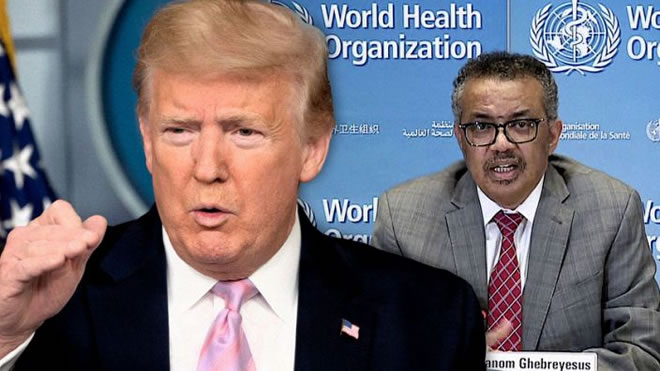President Donald Trump announced Tuesday night that he is halting funding to the World Health Organization while his administration reviews the group’s handling of the coronavirus, accusing it of bungling the response and failing to communicate the disease’s threat.
The move follows weeks of Trump’s escalating attacks on the U.N. health organization as he has sought to deflect scrutiny of his own administration’s slow response to the outbreak.
The U.S. contributes more than any other country to WHO, at more than $400 million per year. Cutting off funds to the group, which has a $4.8 billion annual budget, will be a major blow to the organization as it conducts vaccine trials, distributes test kits and advises governments around the world.
“With the outbreak of the Covid-19 pandemic, we have deep concerns whether America’s generosity has been put to the best use possible,” Trump said during his nightly press briefing.
The move drew swift blowback from the medical community, which said it would undercut global efforts to combat a disease that’s sickened nearly 2 million people worldwide and still has no proven cure or vaccine.
“Fighting a global pandemic requires international cooperation and reliance on science and data,” said Patrice Harris, president of the American Medical Association, who urged the administration to reconsider.
Trump on Tuesday accused WHO of “severely mismanaging and covering up the spread of the coronavirus” and called its opposition to U.S. travel restrictions on China in the outbreak’s early months “disastrous.” While WHO did call such travel bans “ineffective in most situations” at the time, the group did acknowledge that they could buy countries time to “to initiate and implement effective preparedness measures.”
However, the Trump administration squandered time bought by the travel restrictions, failing to ramp up diagnostic testing and prepare the health care system for a surge in coronavirus patients. WHO declared the coronavirus a global health emergency in late January, at a time when Trump was still downplaying the disease and drawing misleading comparisons to the seasonal flu.
Trump himself, who did not declare a national emergency until mid-March, had hailed China’s early response to the pandemic until just a few weeks ago, even as public health experts warned the Chinese government was not completely forthcoming about the novel disease.
Trump ended Tuesday’s night briefing without allowing his health care advisers to take any questions, in a break with usual practice.
Earlier Tuesday, one of Trump’s top health officials praised Chinese officials for swiftly alerting the U.S. to the virus in early January.
“Now, some of the assessments that the Chinese made at that time, were obviously not accurate,” said Robert Redfield, director of the Centers for Disease Control and Prevention, on SiriusXM’s “Doctor Radio” show. “But you know, it’s a testament to them that within a short period of time, as you know, they identified a new coronavirus, which they basically almost immediately shared online, and allowed us to develop the diagnostic test … that gave us eyes on this outbreak.”
U.N. Secretary-General António Guterres on Tuesday night called the WHO “absolutely critical to the world’s efforts” to fight the coronavirus and said it “must be supported.”
“Once we have finally turned the page on this epidemic, there must be a time to look back fully to understand how such a disease emerged and spread its devastation so quickly across the globe, and how all those involved reacted to the crisis,” he said. “But now is not that time.”

